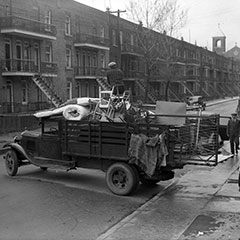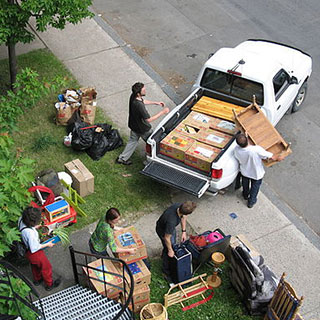Moving on Out!
While the rest of the country celebrates Canada Day, thousands of Québécois spend the 1st of July moving. The importance of this trend is so clear that popular culture has dubbed the date “national moving day”. It is a distinctive feature in Québec, since elsewhere in Canada, lease agreements do not have the same expiry date.
The tradition is anchored in the collective memory, but is relatively recent. It was only in 1974 that the end of twelve-month leases went from May 1st to July 1st. The date was changed to follow the school calendar, since massive migrations in May forced students to finish the year in a new school, sometimes with a different board of education and different programs.
All this moving around animates the streets in a particular way. At the end of June, trucks and trailers fill the air with their rumbling engines; exclamations, groans and curse words echo in back alleys; the atmosphere is buzzing with activity.
“I don’t know if I’m gonna move or if I’m gonna stay”
This lyric was taken from the song Déménager ou rester là (literally To Move or to Stay Put), written by Robert Charlebois and Réjean Ducharme, and performed by Pauline Julien. It talks about the hazards of life as a tenant. It isn’t the only popular song inspired by the moving theme. In the 1930s, the Depression years were quite prolific in this respect. In On déménage (We’re Moving), La Bolduc tells of leases expiring in May and of tenants fleeing poor living conditions. Other songs shed light on the complex – and often difficult – relationships that exist between tenants and landlords. La marche des propriétaires (which roughly translates as The Homeowners’ March), a traditional song by an unknown author, and Le propriétaire (The Landlord), also by La Bolduc, are great examples. In another composition, Ovila Légaré comically talks about a man who constantly changes homes.


